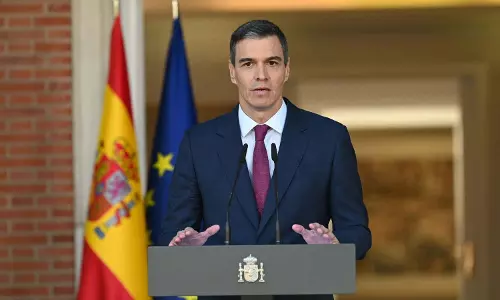
Google CEO sought to keep incognito mode issues out of spotlight: Lawsuit
text_fieldsA new court filing has observed that Google Chief Executive Sundar Pichai in 2019 was warned that describing the company's Incognito browsing mode as "private" was problematic.
However, the browsing mode stayed the course because Pichai did not want the feature "under the spotlight'.
Incognito mode is meant for private browsing, therefore when a user browses in this mode, other people who use the device are not supposed to see those web pages in history. But in case you have not closed the tabs anyone can still see it once they try to open a new tab in Incognito mode, defeating the purpose of the feature.
As per a report by Reuters, Google spokesman Jose Castaneda told that the filing mischaracterizes emails referencing unrelated second and third-hand accounts.
The Alphabet Inc unit's privacy disclosures have generated regulatory and legal scrutiny in recent years amid growing public concerns about online surveillance.
Users last June alleged in a lawsuit that Google unlawfully tracked their internet use when they were browsing Incognito in its Chrome browser. Google has said it makes clear that Incognito only stops data from being saved to a user's device and is fighting the lawsuit.
In a written update on trial preparations filed Thursday in U.S. district court, attorneys for the users said they "anticipate seeking to depose" Pichai and Google Chief Marketing Officer Lorraine Twohill.
The attorneys, citing Google documents, said Pichai "was informed in 2019 as part of a project driven by Twohill that Incognito should not be referred to as 'private' because that ran 'the risk of exacerbating known misconceptions about protections Incognito mode provides.'"
The filing continued, "As part of those discussions, Pichai decided that he 'didn't want to put incognito under the spotlight' and Google continued without addressing those known issues."
Castañeda said teams "routinely discuss ways to improve the privacy controls built into our services." Google's attorneys said they would oppose efforts to depose Pichai and Twohill.
Last month, plaintiffs deposed Google vice president Brian Rakowski, described in the filing as "the 'father' of Incognito mode." He testified that through Google states Incognito enables browsing "privately," what users expect "may not match" up with the reality, according to the plaintiffs' write-up.
Google's attorneys rejected the summary, writing that Rakowski also said terms including "private," "anonymous," and "invisible" with proper context "can be super helpful" in explaining Incognito.






















